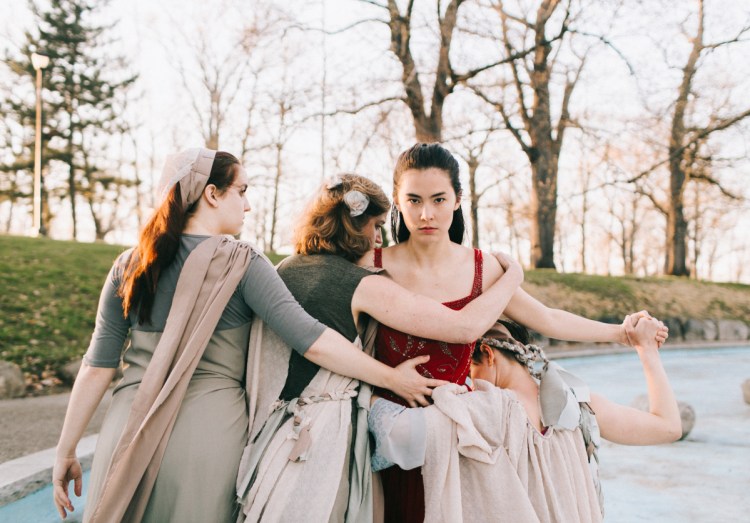Deering Oaks provides the perfect setting for Sarah Ruhl’s roughed-up version of the Greek myth of Orpheus and Eurydice, with real water, trees and stones providing the backdrop to Ruhl’s fantastical ones.
Well, almost perfect – the park is a public place after all, and the cast sometimes competes with the goings on there, from roughhousing on the grass to planes flying overhead. Fenix Theater handled it all with aplomb in a twisted but satisfying rendition of a story that has been the inspiration for more traditional theatrical fare, like the opera and ballet, for eons.
“Finally. Some peace,” said one of the three stones, who are the play’s Greek chorus. “And quiet,” said another, just as one particularly unruly park-goer departed the area near the performance Sunday night. (To the audience that was there, and noticed it all with a laugh: Yes, those lines were written by Ruhl herself years ago.)
The audience was rapt throughout, though, leaning in, as Ruhl’s Orpheus and Eurydice upended the ancient story with language that is poetic and surreal, yet with a classical vibe that is somehow also decidedly of the moment. Orpheus is deeply in love but distracted by music, Eurydice is also in love but distracted by her search for hard-to-find “interesting people,” and her father, already in the underworld, has managed the trick of holding onto his memories in a place from which they’re supposed to have vanished.
The audience’s job was made easier thanks to the strength of this production, paced exquisitely by director Hannah Cordes: At Sunday’s performance, the sun dipped and darkened the park just as Eurydice descended to the Underworld. The small ensemble created a cohesive time and place from disparate worlds; Ruhl’s “real world” is nearly as strange as the Underworld, and her time is recognizable but unnameable.
Eurydice (Erica Murphy) balletic and restless, yet determined, and Orpheus (Nolan Ellsworth), nerdy and obsessed, with both music and his great love, are 21st-century lovers – Eurydice in a belted Audrey Hepburn frock and Orpheus in torn skinny jeans and high-tops. The Lord of the Underworld (Khalil LeSaldo) is loud and predatory, and he gets up to much mischief in two worlds, relenting just once to reunite the lovers if they can follow his conditions. The stones (Hannah Daly, Ella Mock and Casey Turner) stick their noses in the Underworld’s business, clad in destructed classical garb, snooty and demanding and often hilarious – and sometimes simply unable to help being moved by the power of love.
As individual as the performances are, the actors click when they have to, so that everyone’s idiosyncrasies fit like pieces of a puzzle. The standout is Sean Ramey, who plays Eurydice’s father (technically, in Greek mythology, sunny Apollo, but here a deep, learned and generous man) with a sometimes playful, sometimes thoughtful care, lively yet businesslike in his serious gray suit. Ruhl isn’t satisfied with toying with language and character, though; she also twists the story. Those who thought that it was Orpheus, unable or unwilling to resist a peek at his great love, who ruined their second chance, will be surprised. As the Loud Stone says, “Life is like a good meal,” and so is this play.
Daphne Howland is a freelance writer based in Portland.
Send questions/comments to the editors.


